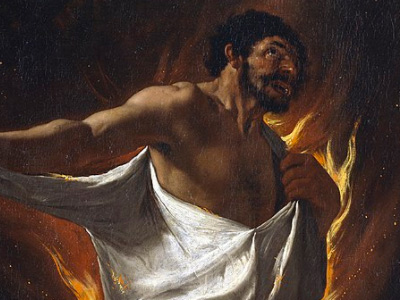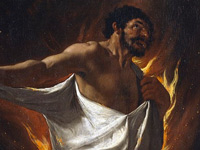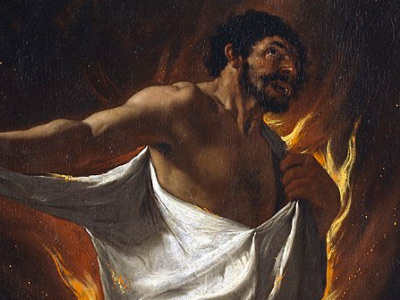Heracles

Heracles (/ˈhɛrəkliːz/ HERR-ə-kleez; Ancient Greek: Ἡρακλῆς, Hēraklēs, from Hēra, "Hera"), born Alcaeus (Ἀλκαῖος, Alkaios) or Alcides (Ἀλκείδης, Alkeidēs), was a divine hero in Greek mythology, the son of Zeus and Alcmene, foster son of Amphitryon and great-grandson and half-brother (as they are both sired by the god Zeus) of Perseus. He was the greatest of the Greek heroes, a paragon of masculinity, the ancestor of royal clans who claimed to be Heracleidae (Ἡρακλεῖδαι), and a champion of the Olympian order against chthonic monsters. In Rome and the modern West, he is known as Hercules, with whom the later Roman emperors, in particular Commodus and Maximian, often identified themselves. The Romans adopted the Greek version of his life and works essentially unchanged, but added anecdotal detail of their own, some of it linking the hero with the geography of the Central Mediterranean. Details of his cult were adapted to Rome as well.
Hero or god
Heracles' role as a culture hero, whose death could be a subject of mythic telling, was accepted into the Olympian Pantheon during Classical times. This created an awkwardness in the encounter with Odysseus in the episode of Odyssey XI, called the Nekuia, where Odysseus encounters Heracles in Hades:
And next I caught a glimpse of powerful Heracles—
His ghost I mean: the man himself delights
in the grand feasts of the deathless gods on high...
Around him cries of the dead rang out like cries of birds
scattering left and right in horror as on he came like night...
Ancient critics were aware of the problem of the aside that interrupts the vivid and complete description, in which Heracles recognizes Odysseus and hails him, and modern critics find very good reasons for denying that the verses beginning, in Fagles' translation His ghost I mean... were part of the original composition: "once people knew of Heracles' admission to Olympus, they would not tolerate his presence in the underworld", remarks Friedrich Solmsen, noting that the interpolated verses represent a compromise between conflicting representations of Heracles.
Character
Extraordinary strength, courage, ingenuity, and sexual prowess with both males and females were among the characteristics commonly attributed to him. Heracles used his wits on several occasions when his strength did not suffice, such as when laboring for the king Augeas of Elis, wrestling the giant Antaeus, or tricking Atlas into taking the sky back onto his shoulders. Together with Hermes he was the patron and protector of gymnasia and palaestrae. His iconographic attributes are the lion skin and the club. These qualities did not prevent him from being regarded as a playful figure who used games to relax from his labors and played a great deal with children. By conquering dangerous archaic forces he is said to have "made the world safe for mankind" and to be its benefactor. Heracles was an extremely passionate and emotional individual, capable of doing both great deeds for his friends (such as wrestling with Thanatos on behalf of Prince Admetus, who had regaled Heracles with his hospitality, or restoring his friend Tyndareus to the throne of Sparta after he was overthrown) and being a terrible enemy who would wreak horrible vengeance on those who crossed him, as Augeas, Neleus and Laomedon all found out to their cost.
LEGENDS

RESOURCES
This article uses material from the Wikipedia article "Heracles", which is released under the Creative Commons Attribution-Share-Alike License 3.0.
© Stories Preschool. All Rights Reserved.









